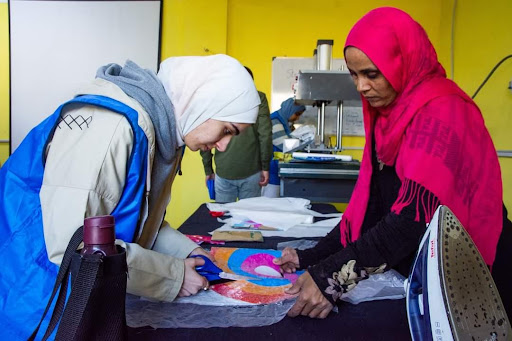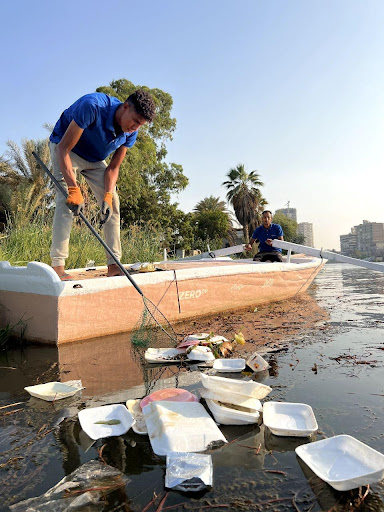Verynile initiative achieves positive transformation of plastic waste in Egypt –
We often hear about smoking or substance addiction, but plastic addiction is a condition that probably arouses our curiosity and surprise. It is not just a fiction, As plastic ocean pollution continues to grow, these resulting problems will only get worse unless we take action. The burden of responsibility for plastic should not only fall on consumers. Instead, by redesigning plastic production before it even reaches end users, we can steer manufacturers towards production-based solutions to this global problem.
Millions of tons of plastic waste have accumulated at the bottom of the oceans and seas, and these wastes accumulate and disintegrate into tiny fragments known as microplastics, forming islands of waste floating above the water. Marine organisms feed on chemical deposits resulting from decomposing plastic. These organisms, in turn, are eaten by Fish and other marine species, threatening this fragile environment and depleting marine organisms and negatively affecting their activity. It threatens not only the safety of marine animals, but also millions of people who depend on fish and other seafood for their food and it also affects areas where sea-related tourism is the main source of income. In addition, plastic pollution hinders the process of oxygen production in the atmosphere, which is why the marine environment is a major source of oxygen on the surface of the planet.
The link between plastic pollution and climate change does not stop there, plastic pollution can affect habitats and natural processes and reduce the ability of ecosystems to adapt to climate change. And not only that, plastic pollution can negatively affect the lives of millions of people and reduce the chances of producing food and enjoying social well-being.
According to reports from the World Economic Forum, the presence of plastic in the oceans is expected to become more than the presence of fish by 2050, which poses a serious threat to the environment and marine life. Accordingly, the need for immediate and effective action is required to reduce the use of plastic and address the resulting pollution of the river.
Plastic gets into our food and water, and is a serious health hazard; kills an estimated one million seabirds and 100,000 marine mammals each year. Plastic pollution costs a minimum of $13 billion annually in damage to marine ecosystems. By closing the plastic tap we can reverse this negative trend but we must act now.
– Minna Epps, Director, Global Marine and Polar Programme, IUCN
Thinking outside the traditional plastic box
The “Verynile” initiative is one of the inspiring initiatives that aims to protect the Nile River from plastic pollution, promote awareness of the importance of preserving the environment, address plastic addiction, contribute to creating a healthier life, a healthier planet and preserve our planet for future generations.
The initiative started working with fishermen to clean up the water and the organization launched its recycling initiative in order to protect the Nile River from waste and raise awareness of the importance of reducing the use of single-use plastics, and to combat plastic pollution. Its headquarters is located in Al-Qursayah Island, a neglected island in the middle of the Nile in Cairo, to be the ideal starting point for this initiative.
The matter did not stop at the green project just to cleanse the Nile waters of waste and raise awareness of the importance of reducing plastic, “Verynile” has developed a workshop for recycling plastic waste, to help women and poor families in the island of Qursayah, to work and then increase income
The initiative works through three main axes including:
-
-
-
- The fishermen project, to provide job opportunities for fishermen working in the fishing of waste, and sell it to the initiative in kilograms, according to the amount collected daily, and is calculated at a higher price than the market to encourage them to work on the one hand and to clean the Nile on the other hand in preparation for recycling. Fishermen emphasize that since participating in the collection of plastic, the daily ration of fish they catch from the river has increased.
- Women empowerment including the women’s Innovation Workshop project, to recycle single-use plastic bags, in order to make products for daily use of those bags. The project has provided job opportunities for women and girls on the island of Qursayah and not only did they create opportunities for women, they started teaching them to read , write and trust and take care of themselves.
- As for the third axis, it is represented in conducting awareness campaigns to reduce plastic consumption, such as the campaign to ban the use of single-use plastic bags by disseminating information and statistics that contribute to raising public awareness against the use of these bags.
-
-
The site on the island is divided into more than one section, in which the plastic bottles supplied by fishermen to the initiative are sorted; where transparent plastic water bottles are pressed and the lids of water bottles are rotated, where they are pressed on a special machine to produce marble-like plates that can indeed be an alternative to it in some uses. The second part , in which the ladies from the island were trained on the recycling of plastic bags, and the production of various products such as women’s handbags, plastic covers for lunch boxes, pencil cases, money bags, makeup cases, laptop bags, shopping bags, in addition to crochet products, colorful curtains.

Recently, training workshops have been held in partnership with Floating Forward Project which aims to create increased environmental awareness through interactive initiatives in schools. By supporting the introduction of the issue into Egyptian educational discourse, future generations will grow up with a comprehensive understanding of environmental protection.
What can we do
Driving change through informed decision making via multi-stakeholder dialogues has been the approach used to address the impact of plastic leaking into the marine environment. Sharing knowledge, building human capacity, informing and guiding policy, and engaging with businesses are the four pillars uses to address the crisis at the critical points where interventions are needed most.
Verynile initiative achieves positive transformation of plastic waste in Egypt









